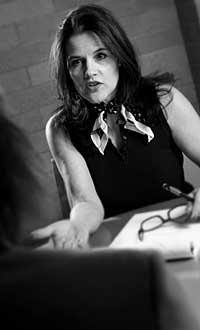

 Sabbath
School:
Sabbath
School:
Engaging Community, Mind and Spirit
by Teri Zipf
At a time in her life when Deborah Silva wasn’t even sure she wanted to be in church, a Sabbath school class engaged her mind, accepted her doubts and, eventually, drew her back into the church.
“My husband and I weren’t raised Adventist,” she says. “And as adult converts, we were zealous about our faith.” Because of certain events that occurred later in her personal and church life, she was frustrated and even angry with the Seventh-day Adventist church. Silva was, she says, “bruised and battered.”
But then, at a time when her personal life was in upheaval, she says, “I found myself in the Kretschmar Sabbath school class at the College Church. I would watch this class of about 50 people; it was fascinating, engaging. It was an incredibly diverse group with pastors, college students, people with little education, Ph.D.s, conservatives, and liberals. There were people who would not go to church but they would go to this class.”
That group experience had a significant influence on how Silva felt about the church as a whole and became a turning point in her life. It affected her educational choices, her professional experiences and her spiritual development. It led her back into the church and into teaching in the Communications Department at Walla Walla College.
“I’m a speech person,” Silva says. “I like to talk, and I like the way speech organizes thought. I teach communication, and in a way, my whole life is wrapped around speech communication.” After finishing her master’s degree in organizational communication, Silva and her family were settled in the Walla Walla Valley and she didn’t want to pursue her doctoral degree out of state. Washington State University (in Pullman) did not have a doctoral program in communication at that time and Silva proposed an interdisciplinary, three-part doctorate consisting of business management, social psychology and organizational communication. All three disciplines look at communication through different but relevant theories.
“All organizations have to adapt to survive,” says Silva, “and the way they make adaptive decisions is through communication.” Organizations often change their focus, their structure and their product to meet the changing needs of society—and if they fail to do so, they cease to exist.
“But how,” Silva wondered, “does an organization like the church, which has a fundamental idea as its ‘product’ adapt to changes in society? How does it continue to meet ‘consumer’ needs?”
The answer, she believes, is to be found in Sabbath school classes.
Communication creates a group, which structures an organization. Sabbath schools can be an important place in structuring the organization. And some people may not realize that this is happening—both locally or in the church at large.”
So it was natural that Silva’s dissertation, on small group communication within organizations, would focus on Sabbath school classes within the greater organization of the Seventh-day Adventist church.
“I’ve often been to churches
where Sabbath school classes are filled with primarily older people and children.
Yet, Sabbath schools are a significant part of the organizational structure
of the church. There are churches where adult Sabbath school education is
exciting, engaging, and compelling, but I’m not sure it’s the norm.”
She feels that there is something happening at the Walla Walla College Church
that’s different. “There are nine adult Sabbath school classes at
the College Church,” Silva says. “This church is progressive and
sensitive to the needs of the members. It has options such as 12-Step groups,
classes that involve story telling, seminars and more traditional format.
It’s vibrant.”
She feels that this is a church with classes where effective small group communication happens. To find out why—and how—Silva has been studying the classes and the students themselves. She requests permission from the teachers, who in turn get permission from the class, to videotape the classes. Then she does in-depth interviews of individual members—some of whom have attended Sabbath school for 10 to 15 years.
It’s too soon to have reached any conclusions or found practical applications for her study, but her ultimate goal is to provide information that’s useful to the church and to organizations at large. When she has finished the study and tabulated the results, Silva hopes to know more about how communication in these classrooms works; what makes it a successful Sabbath school classroom experience and what stands in the way of successful communication.
“I feel compelled to give back,”
Silva says. “That Kretchmar class was a place of healing. If it did that
for me, maybe there are other people and other classes and other ways that
healing could happen.” W
------------
Teri Zipf is a 1993 English graduate and works as a
freelance writer in Milton-Freewater, Ore.